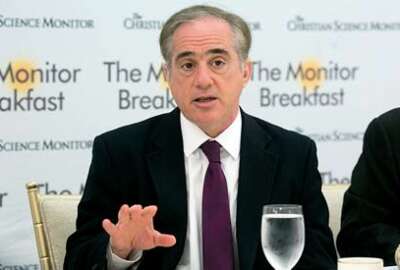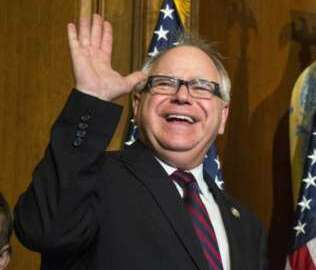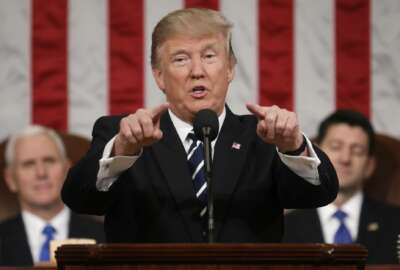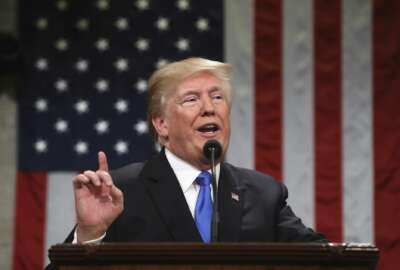
Trump wants to give every cabinet secretary expanded authority to remove employees
In his first State of the Union, President Donald Trump highlights VA’s success with removing 1,500 employees under the June 2017 law.
President Donald Trump is calling on Congress to expand the Veterans Affairs Department Accountability Act to all of the government and end the Defense sequester.
In his first State of the Union, Trump said he wants to make agencies and the government more accountable to the taxpayers.
“I call on the Congress to empower every cabinet secretary with the authority to reward good workers — and to remove federal employees who undermine the public trust or fail the American people,” Trump said Tuesday night. “Since its passage, my administration has already removed more than 1,500 VA employees who failed to give our veterans the care they deserve — and we are hiring talented people who love our vets as much as we do. I will not stop until our veterans are properly taken care of, which has been my promise to them from the very beginning of this great journey.”
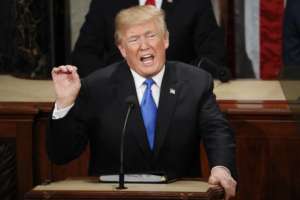
The President signed the VA Accountability Act into law in June. It aimed to fix an accountability process that many said was broken, particularly in the wake of the 2014 scandal at the VA hospital in Phoenix, Arizona.
The bill lowers the burden of proof to fire employees, allowing a dismissal even if most evidence is in a worker’s favor.
The bill also gave the secretary the direct authority to hire and appoint new medical center directors at VA hospitals.
“I am not looking for the same old practices and behaviors that led us to where we are now,” David Shulkin, the VA Secretary, said on June 20. “I am looking for a different type of leadership style from the people in my organization, and inherently, that’s going to be associated with risks, as long as it’s measured and we can determine when and if we need to adjust course on those decisions.”
A White House fact sheet detailed the impact of the VA Accountability Act even further. The administration says VA suspended 443 employees and demoted 83 others through Dec. 31, 2017.
“Under President Trump’s leadership, VA is engaged in the largest transformation and modernization effort in decades. As part of this effort, the department is tackling head-on issues that have lingered for years, including accountability, whistleblower protection, improving transparency and customer service for Veterans and expanding suicide prevention and mental health care services,” Shulkin said in a release Tuesday night. “VA will have another groundbreaking year in expanding and improving our services for Veterans, particularly when it comes giving them more choices over their health care decisions, and improving yet again on the timeliness of our decisions on Veterans’ benefits.”
Lawmakers have introduced several bills to try to increase employee accountability over the last few years. In July, Rep. Todd Rokita (R-Ind.) authored legislation that would make all new employees “at-will” employees.
In 2016, lawmakers tried to increase the accountability of the Senior Executive Service, which would have extended the probationary period for career employees from one to two years, and change pay retention for career appointees who are fired for poor performance, meaning those employees would get paid under the basic pay rates they received before entering the SES.
Federal employee groups expressed both support for new accountability measures as well as concerns that they were going too far.
The Senior Executives Association said in June that the “accountability measures should be balanced by a new risk/reward framework that incentivizes high performing civil servants and encourages them to excel in the delivery of their vital mission of taking care of our veterans.”
While the American Federation of Government Employees (AFGE) also said in June that the bill would be the “first step in weakening merit system principles for the entire civil service, not just employees at VA.”
Beyond the VA bill, few of these attempts gained much traction.
Along with the accountability efforts, the White House detailed a host of changes by agencies to improve how they serve citizens.
For instance, the administration’s reorganization and reform efforts at the Agriculture Department are resulting in the merger of overlapping offices such as those overseeing commodity procurement, food quality grading and nutrition.
At the Energy Department, the administration said the secretary announced his intention to modernize the department, including empowering the National Laboratories to focus on mission-critical work and return the department to its original three under secretary statutory framework, which will better advance priorities, address present and future energy challenges, and refocus the department on its core missions.
At the Interior Department, the White House said Secretary Ryan Zinke is “restructuring the bureaucracy and establishing common regional boundaries to facilitate coordination between bureaus.”
Secretary of State Rex Tillerson “is ambitiously reforming the State Department, realigning priorities to most effectively and efficiently meet the country’s diplomatic and national security needs.”
And the White House said the Department of Defense “is incorporating business reforms, coupling increased performance with affordability to ensure the best value is gained from each taxpayer dollar.”
In that same vein of DoD spending, Trump also called on Congress “to end the dangerous defense sequester and fully fund our great military.”
This is the same request he made last March during his address of Congress as part of his request to increase the DoD budget by $54 billion.
He said his administration must “modernize and rebuild” the country’s nuclear weapons so it’s a deterrent to other potential acts of aggression.
Trump made no mention of ending the civilian agency sequester, however.
Aside from federal employee accountability, the president highlighted a few other ongoing management priorities.
He highlighted his administration’s ongoing effort to reduce and eliminate unnecessary or burdensome regulations.
“In our drive to make Washington accountable, we have eliminated more regulations in our first year than any administration in history,” he said.
Trump also highlighted the efforts by the Food and Drug Administration to approve new and generic drugs and medical devices last year.
Additionally, Trump reiterated his desire for new infrastructure spending to help rebuild and repair bridges and roads.
“Every federal dollar should be leveraged by partnering with state and local governments and, where appropriate, tapping into private sector investment — to permanently fix the infrastructure deficit,” he said. “Any bill must also streamline the permitting and approval process — getting it down to no more than two years, and perhaps even one. Together, we can reclaim our building heritage. We will build gleaming new roads, bridges, highways, railways and waterways across our land.”
Interestingly, Trump didn’t mention anything about cybersecurity, IT modernization, improving citizen services or electronic health records. The lack of any specifics around these topics, especially in regards to serving veterans or addressing threats to the nation, differed than previous SOTUs.
Copyright © 2025 Federal News Network. All rights reserved. This website is not intended for users located within the European Economic Area.
Jason Miller is executive editor of Federal News Network and directs news coverage on the people, policy and programs of the federal government.
Follow @jmillerWFED
Related Stories
